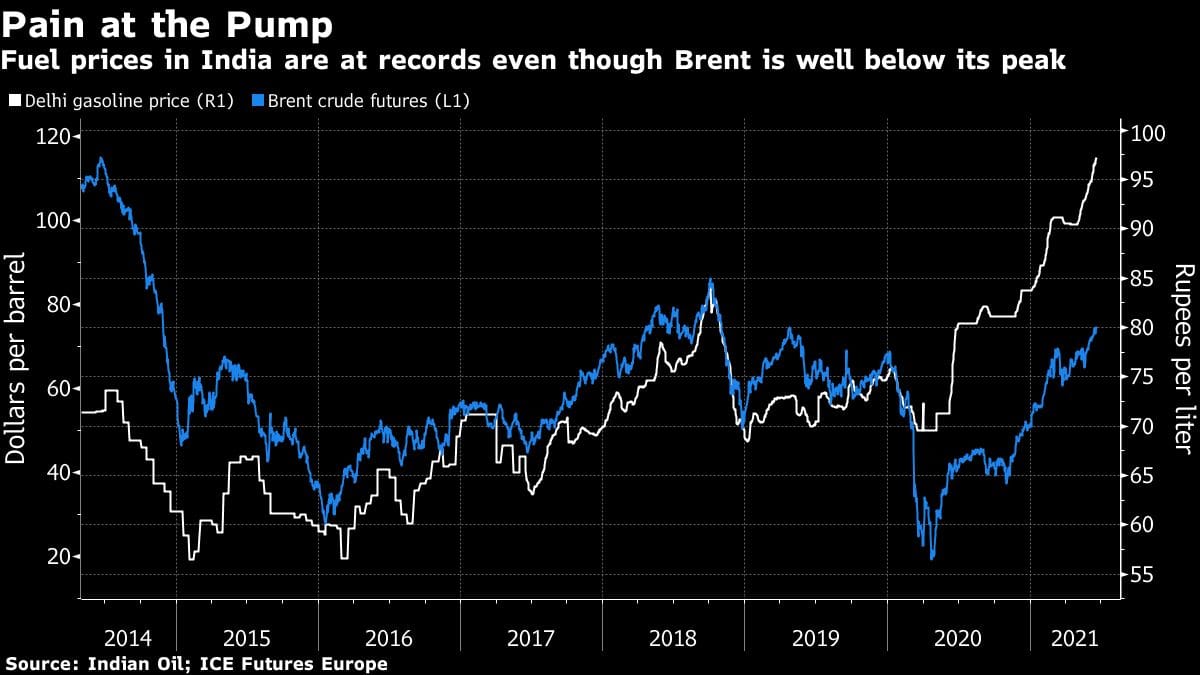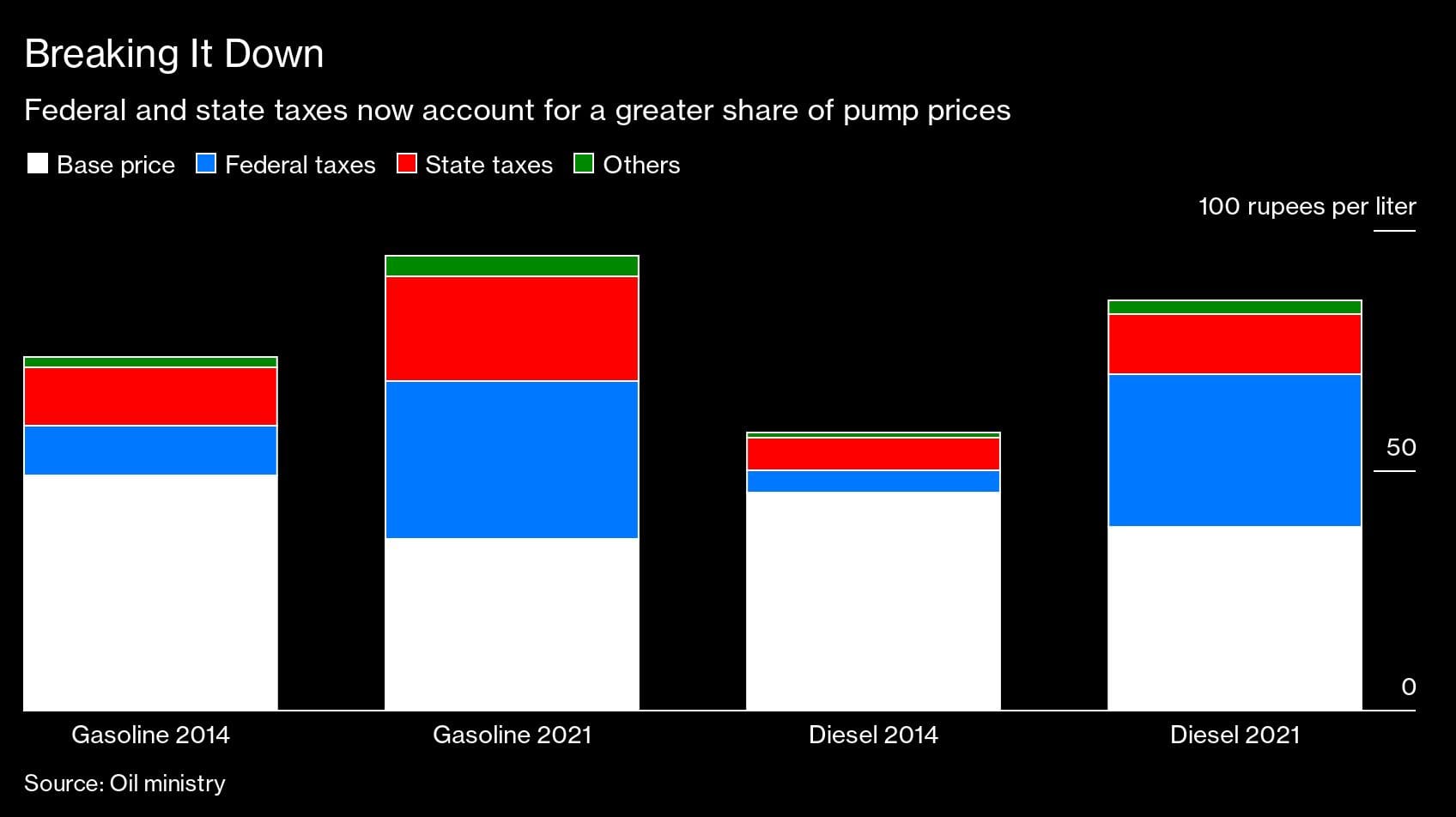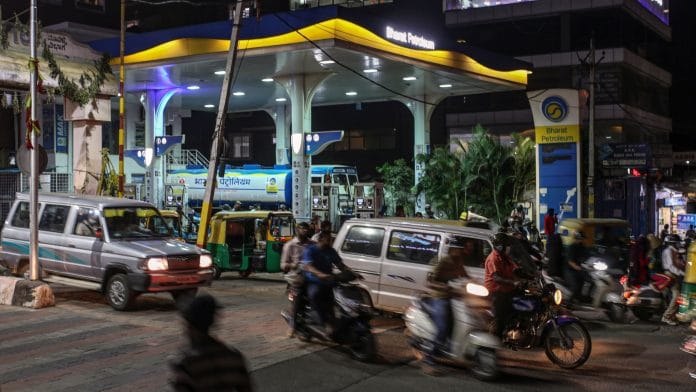New Delhi: Indian pump prices are in unchartered territory as ever-increasing government levies coincide with crude’s recovery from the depths of the Covid-19 pandemic.
Fuel costs have been ratcheted up to current levels by the combined effects of rising benchmark Brent prices and numerous tax hikes over the past few years. The record-high petrol and diesel prices are leaving some Indian car owners unable to afford the cost of using their vehicles and spurring the country’s transport industry to agitate for change.

Buying petrol in major Indian cities such as Mumbai costs almost twice as much as in New York, casting a shadow on the recovery across Asia’s second-largest oil guzzler as virus-related movement restrictions are eased. The federal government kept upping taxes last year even as it put the country into a national lockdown and global crude prices collapsed.
Mumbai petrol costs have risen by more than 25% over the past three years, while diesel prices have climbed by a third over the same period, according to data from Indian Oil Corp. The run-up in prices is adding to inflationary pressures to the Indian economy amid a broad commodity rally.
Biggest drivers
In India’s capital of New Delhi, petrol prices have jumped almost 20% year-to-date, alongside a similar surge in diesel costs. Federal taxes on petrol, which powers scooters and motorcycles, have more than tripled over the last seven years. Those on diesel, the country’s most-used fuel, have swelled by seven times over the same period.


Higher prices are hitting the country’s burgeoning middle class, the engine that’s driven India’s economic and oil demand growth in recent times. Rahul Srivastava, a 48-year-old former executive at an advertising agency in New Delhi, upgraded to a shiny new sedan just a month before the country went into a nationwide lockdown last year. Now he’s considering selling his vehicle.
“Driving the car is now a luxury for me,” said Srivastava, who turned to stock trading after losing his job and is now making about a fifth of what he used to. “Earlier, I would tank up whenever I needed to refill and it would cost me 3,000 rupees ($40). Last time, refilling less than half the car’s tank cost me more than $25. I now drive only when it’s absolutely necessary.”
Unfortunately for Srivastava, truck drivers, and millions of others, India’s budget deficit ballooned to a record last year, and fuel taxes represent a reliable source of income that’s been hard for the government to ignore.
The taxes are eroding disposable incomes and feeding inflationary pressures, according to ICRA Ltd., the local unit of Moody’s Investors Service. “Definitely, the high prices will have an impact on the growth and return to normalcy,” said Prashant Vasisht, Vice President at ICRA. “Prices above a particular level do pinch and people travel less and try to save on the fuel cost.”
Demand impact
While India’s economy is now grinding its way back from a 7.3% contraction in gross domestic product in the year to March, millions remain under pressure. Unemployment is still rising, and the Pew Research Center estimates the nation’s middle class shrank by 32 million people in 2020.
“High prices do have an impact on fuel demand,” said Senthil Kumaran, head of South Asia oil at FGE. “But, at this point the price effect will be less significant as the country is still coming out of the second-wave lockdowns. Pent-up demand will outshine high retail prices, so, it won’t pause the demand recovery. But if high prices continue through July, then it will impact more.”
With fuel prices soaring, India’s truckers have had enough. Drivers have limited ability to pass on the rising prices, which account for about 70% of the cost of operating a truck, according to the All India Motor Transport Congress, which represents more than 14 million truckers and bus and tourist vehicle operators.
“The record high diesel and petrol rates have impacted the livelihoods of millions of small transport operators and wage earners, who are struggling to make ends meet,” said Kultaran Singh Atwal, president of AIMTC. The grouping has plans to go on a nationwide protest this week, and follow that with a general strike if the government doesn’t reduce fuel prices, he said.-Bloomberg
Also read: Nirmala Sitharaman announces new Covid recovery package, expands credit relief






